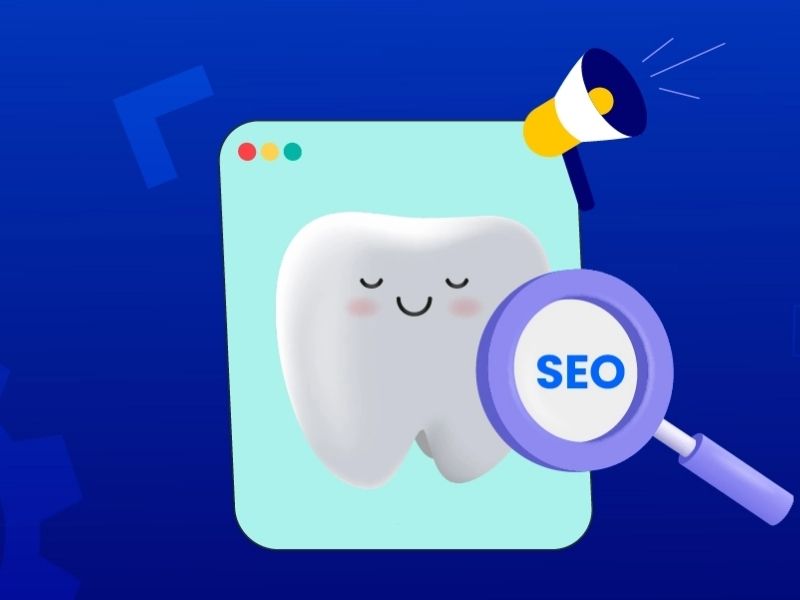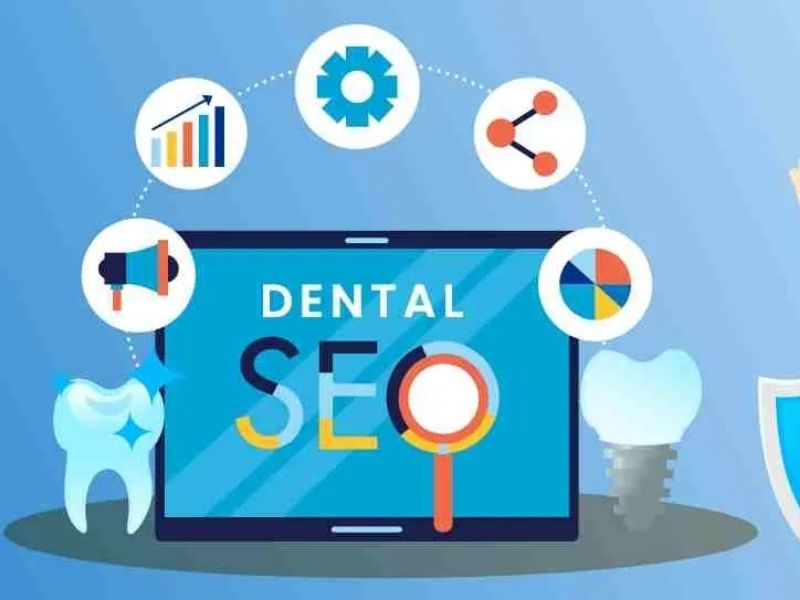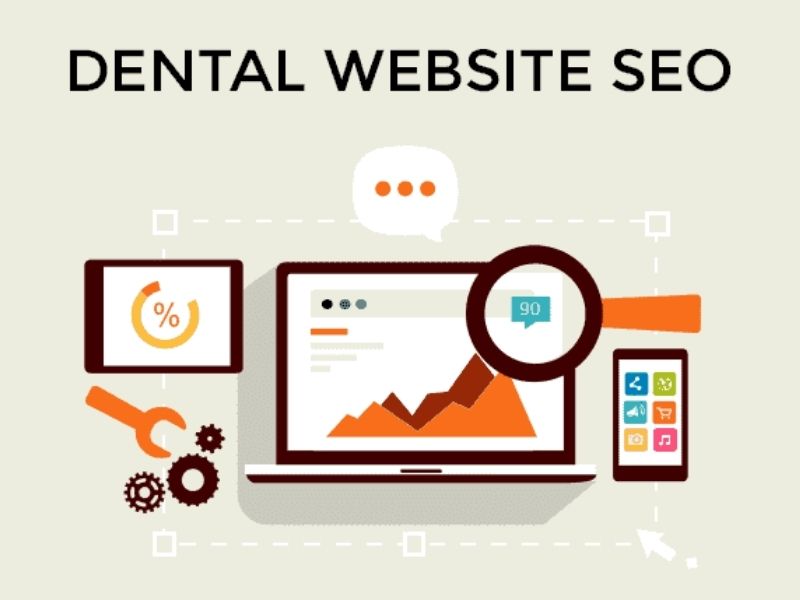In 2025, dentistry is more competitive than ever, and the key to standing out isn’t just about having top-notch skills or a warm, inviting office, it’s about being visible online. That’s where SEO for dentists comes in. Imagine your ideal patients searching for a dentist in your area, and your practice being the first one they see. Sounds amazing, right? But how do you get there?
At OctopusWriters, we understand the challenges dental practices face when trying to navigate the ever-changing digital landscape. That’s why we’ve crafted this guide to help you not only rank higher on search engines but also turn clicks into appointments. Ready to discover the proven tactics that will make 2025 your best year yet? Let’s dive in and uncover the secrets of SEO success for dentists!
What is SEO for Dentists?
SEO for dentists refers to the process of optimizing a dental practice’s online presence to attract more patients through search engines like Google. It involves a combination of strategies designed to improve your website’s visibility in search results, ensuring that when potential patients search for services like teeth cleaning, braces, or emergency dental care, your practice is one of the top options they see.

In essence, SEO for dentists focuses on helping you connect with local patients at the right time, when they’re actively looking for dental care. This includes everything from targeting keywords specific to your services to optimizing your website for speed, mobile-friendliness, and user experience. By implementing effective SEO strategies, your practice becomes easier to find, builds trust with potential patients, and ultimately grows your business.
Why SEO Matters for Dentists
Why does SEO for dentists matter? The answer lies in its power to transform your practice’s online presence and patient flow. Let’s break it down with some key insights and examples to illustrate how crucial it is for modern dental marketing:
Boosts Local Visibility and Awareness
Did you know that every month, over 2.2 million people in the U.S. search for terms like “dentist near me”? This massive audience is actively looking for dental care, and an optimized local SEO strategy ensures they find your practice first.
By targeting specific keywords such as:
- “Dentist in Los Angeles”
- “Best orthodontist near me”
- “Dental care Houston”
You increase your website’s chances of appearing at the top of local search results. The higher your ranking, the more likely potential patients are to click and choose your services.
Drives More Traffic to Your Website
If your dental practice isn’t showing up on the first page of Google, you’re missing out on a massive opportunity to connect with potential patients. Ranking high on search engines directly impacts the number of visitors to your website, and here’s why:
- Studies reveal that the top organic search result on Google receives 27.6% of clicks. By comparison, the second result only gets 15%, and it continues to drop significantly with each lower ranking. If your practice isn’t on the first page, you’re invisible to most searchers.
- SEO ensures that the visitors who land on your site are actively looking for the services you offer. For example, someone searching for “emergency dentist near me” likely needs immediate care. A well-optimized website can capture these highly valuable searches and turn them into booked appointments.
By driving more targeted traffic to your website, effective SEO for dentists doesn’t just increase clicks, it converts those clicks into real patient inquiries.
Builds Trust and Authority

When it comes to healthcare, trust is everything. Patients are more likely to choose a dentist whose online presence reflects professionalism, expertise, and care. SEO isn’t just about bringing traffic to your site; it’s about showing potential patients why your practice is the right choice.
Here’s how SEO for dentists helps build trust and authority:
Informative Content Positions You as an Expert:
- Blog posts answering common patient questions (e.g., “How does teeth whitening work?” or “What to expect during a root canal”) demonstrate your knowledge and help patients feel confident about your services.
Google’s Stamp of Approval:
- Ranking higher on search engines isn’t just about visibility; it signals to patients that Google trusts your website. A well-optimized site with clear, accurate information gives both Google and your audience confidence in your practice.
Educational Resources Create a Connection:
- Patients searching for specific information, like “What’s the process for dental implants?” or “How to care for braces,” appreciate resources that address their concerns. By providing answers, you establish your practice as approachable, reliable, and helpful.
Expands Your Patient Base Organically
The beauty of SEO for dentists lies in its ability to deliver long-term results. Unlike short-lived paid ads, SEO works consistently to grow your patient base over time. As your rankings improve, more potential patients will discover your practice. Pair this with outstanding dental care, and happy patients will become your best advocates, referring friends and family to you.
Reduces Marketing Costs
Let’s face it, traditional advertising can be pricey. Radio ads, billboards, and even pay-per-click campaigns can drain your marketing budget quickly. On the other hand, SEO for dentists offers a cost-effective alternative. While it requires consistent effort, SEO delivers better returns on investment over time, helping you attract patients without breaking the bank.
By improving your online presence, driving traffic, building credibility, and attracting patients, SEO for dentists transforms how you connect with your community. Ready to learn how to implement it effectively? Keep reading, we’ll guide you step by step!
How Search Engines Decide Dental Website Rankings
Search engines, like Google, aim to deliver the most relevant and useful results to users as quickly as possible. Their ultimate goal is to satisfy searchers so they keep coming back. For dental practices, this means showing up where potential patients are most likely to look.
When someone searches for a dentist, your practice can appear in three primary areas:
- Local Service Ads or Google Ads: These paid spots are at the very top of search results. Optimizing these ads falls under Search Engine Marketing (SEM), which is separate from SEO for dentists.
- Local Map Results: Google Maps highlights practices close to the searcher’s location.
- Organic Results: These are the non-paid listings below the map section, influenced by how well your website is optimized.
SEO for dentists focuses on improving your visibility in the local map results and organic listings. By implementing the strategies covered in this post, you can boost your rankings on the Search Engine Results Page (SERP) and attract more patients without relying solely on paid ads.
Best SEO For Dentists Plan to Attract More Patients
To generate more patient leads and expand your dental practice, having a well-rounded SEO plan is crucial. This means optimizing your website, producing high-quality content, and earning credible backlinks to strengthen your search engine rankings. By doing so, you can effectively draw the attention of potential patients searching for dental services.
A successful SEO approach combines both on-page and off-page strategies to ensure your practice is easily discoverable. On-page SEO focuses on improving website elements like content and metadata, while off-page SEO builds your online reputation through methods like backlinking. By tailoring your SEO plan to your practice’s unique needs, you can attract targeted visitors and turn them into loyal, long-term patients.
13 Effective SEO Tips for Dentists to Enhance Online Presence
Address Technical SEO Issues
Technical SEO forms the backbone of your website’s performance, contributing significantly to how well your site ranks on search engines. By optimizing specific features, you can make your site more accessible to search engine crawlers, leading to better rankings. Websites that load quickly and are free from technical errors tend to perform better in search results.
Key elements of a technically optimized website include:
- Fast-loading pages to prevent user drop-offs.
- Clear accessibility for search engines through features like a robots.txt file and a sitemap.
- Elimination of dead links and duplicate content.
- SSL/HTTPS security to ensure trustworthiness.
- Integration of structured data for better search engine understanding.
If this sounds overwhelming, don’t worry, professional help is readily available. Conducting a technical audit with tools or consulting with your web development team can help identify and fix any issues.
Enhance Local SEO for Dentists Page Speed for Better User Experience
Website speed plays a critical role in user satisfaction and SEO rankings. Research shows that if a site takes over three seconds to load, nearly 40% of visitors will leave immediately. This bounce rate signals to Google that users are unhappy, resulting in lower rankings.
To improve your website’s load speed, consider the following:
- Test your site speed using tools like Google’s PageSpeed Insights.
- Update your website to meet Google’s latest requirements, such as using WebP image formats, which offer high-quality visuals with smaller file sizes compared to PNG or JPEG formats.
- Regularly review and optimize backend elements like code, plugins, and hosting to ensure they don’t slow down your site.
A faster website not only ranks higher but also provides a smoother experience for potential patients, keeping them engaged and reducing bounce rates.
Claim and Optimize Your Google Business Profile (GBP)

Your Google Business Profile acts as a virtual storefront for your dental practice. It’s a free tool that lets you manage how your information appears on Google’s Search and Maps, making it essential for improving local visibility.
An optimized GBP offers several advantages:
- Enhanced Visibility: Local patients often turn to Google Maps for nearby dentists, and a well-maintained GBP ensures your practice appears in these searches.
- Trust Building: Positive reviews, accurate business details, and professional photos foster credibility and make patients more likely to choose your services.
- Patient Engagement: Regularly post updates, offers, and events to keep your audience informed and connected.
- Data Insights: Use GBP analytics to track how patients discover your practice and where they’re coming from.
To claim your GBP, start by searching for your practice on Google. If it hasn’t been claimed yet, you’ll see a “Claim This Business” link in the knowledge panel on the right side of the search results. Follow the prompts to verify ownership and unlock editing capabilities. With an optimized profile, you can effectively attract more local patients and establish trust.
Keep Your Google Business Profile Updated
Once you’ve claimed your Google Business Profile (GBP), the next step is keeping it updated with accurate and comprehensive information. Start by ensuring your NAP (Name, Address, and Phone) details are correct. Using a standardized format, such as the USPS address format, helps maintain consistency across directories, which is crucial for improving local search rankings.
Regularly updating your GBP with new photos, operating hours, and announcements keeps your profile fresh and engaging. Google rewards active profiles with better visibility, making this an essential part of SEO for dentists.
Optimize Every Aspect of Your Google Business Profile
A claimed and updated GBP is good, but an optimized profile is even better. Optimization increases your chances of ranking higher on Google Maps and local search results. Key steps to enhance your profile include:
- Choosing the right categories: Use “Dentist” as your primary category rather than broader terms like “Dental Clinic.” Add up to 2-3 relevant secondary categories if your practice offers specialized services.
- Adding services: List all the services you provide in the designated section to ensure patients find exactly what they need.
- Maximizing location slots: If your practice operates in multiple locations, fill out all 20 location slots to expand your reach.
These actions contribute to a stronger local presence and reinforce the effectiveness of your SEO for dentists strategy.
Select the Right Keywords for Optimization
Effective keyword selection is foundational to SEO for dentists. Begin by identifying the main services you want to promote and matching them with high-traffic keywords. Examples of popular dental keywords include:
- “Dentist in [your area]”
- “Best dentists in [your area]”
- “Emergency dentist [your area]”
In addition to broad keywords, incorporate long-tail keywords. While these receive lower search volumes, they often lead to higher conversions due to their specificity. Examples of long-tail keywords for dental practices include:
- “Dentist that accepts medical insurance”
- “All-on-four dental implants near me”
- “Family dental office near me”
To simplify the process, use tools like Ahrefs Keyword Generator or Google Keyword Planner to identify opportunities tailored to your practice. Strategically using these keywords on your website ensures Google connects your services to patient searches effectively.
Leverage Blogging to Strengthen SEO

Blogging is a powerful yet often underutilized tool in SEO for dentists. An active blog with informative, well-written content builds trust with potential patients and signals to Google that your site provides value.
Start by integrating a blog section into your website. It’s a simple addition that can be implemented by any web design professional. Once live, focus on creating original, keyword-rich posts that are at least 650 words long.
Don’t forget to include geo-specific keywords like city and state names to enhance local relevance. For example, instead of writing “dentist near you,” use “family dentist in [your city].”
With this approach, your SEO for dentists strategy becomes more robust, helping your practice connect with patients and grow steadily.
Commit to Original Copywriting
Original content is a cornerstone of successful SEO for dentists. Search engines prioritize unique, high-quality content when determining rankings, making it essential to ensure every page on your site is free of duplication. Whether it’s your homepage, service descriptions, or blog posts, originality not only improves rankings but also builds trust with potential patients.
To streamline the process of creating optimized content, consider using tools like Yoast or Rank Math if your site is built on WordPress. These plugins analyze individual pages and provide actionable suggestions, such as:
- Ideal content length to maintain reader engagement.
- Keyword density for effective optimization.
- Proper linking structures for easy navigation.
- Metadata enhancements to improve search engine visibility.
If you lack the time or resources to create fresh content consistently, partnering with a dental SEO company can ensure your website stays updated with engaging and optimized copy. This investment not only saves time but also enhances your overall SEO for dentists efforts.
Build High-Quality Local Inbound Links
Inbound links, also known as external links, are a powerful ranking factor in SEO for dentists. These links act as endorsements from other websites, signaling to Google that your dental practice is trustworthy and relevant. For example, a link from a respected local business directory or an article about oral health can significantly boost your rankings.
On the flip side, weak or spammy links can harm your site’s credibility and rankings. Always ensure the links pointing to your website come from reliable sources.
Leveraging Citations for Inbound Links
Citations are another critical component of SEO for dentists. They are references to your practice’s name, address, and phone number (NAP) on other websites, often in the form of directory listings.
These citations create inbound links to your website, helping search engines see your practice as a credible source. However, it’s important to regularly audit your citations to ensure accuracy. Inconsistent NAP information across listings can confuse both search engines and potential patients, negatively impacting your SEO performance.
Building quality inbound links and maintaining clean, accurate citations are essential strategies to establish your dental practice as a trusted authority online. By incorporating these techniques into your SEO for dentists plan, you’ll not only improve search rankings but also create a more credible and professional online presence.
Develop a Robust Internal Linking Strategy
Internal links, which connect one page of your website to another, play a pivotal role in effective SEO for dentists. For example, a blog post about dental implants could link to your dedicated dental implant service page, creating a seamless user experience while improving site navigation for search engines.
Here’s why internal links are essential:
- Facilitate Search Engine Crawling: Search engine crawlers rely on a clear and accessible link structure to navigate your site. Internal links ensure all pages are discoverable and indexable.
- Highlight Key Services: Internal links signal to Google which pages are most important, helping to align your website’s structure with the services you want to promote.
- Improve User Experience: They guide visitors to related content, keeping them on your site longer and increasing the likelihood of conversion.
Avoid common pitfalls like masking or burying navigation links, as this can hinder search engines from indexing key pages. A well-thought-out internal linking strategy is a simple yet powerful tool to enhance your overall SEO for dentists efforts.
Ensure Your Website is Mobile-Optimized
With most online searches now happening on mobile devices, mobile optimization is no longer optional, it’s a necessity.
Here’s how a mobile-optimized site benefits your dental practice:
- Frictionless User Experience: A mobile-optimized site reformats automatically for smaller screens, ensuring patients can easily navigate and interact with your content.
- Improved SEO Performance: Sites designed with mobile-first principles rank higher, as Google rewards user-friendly mobile experiences.
- Increased Patient Engagement: A fast, responsive mobile site makes it easier for patients to find and contact you, boosting conversion rates.
To check if your site is mobile-friendly, use Google’s Mobile-Friendly Test tool. If improvements are needed, work with a web developer to ensure your site delivers a flawless experience across all devices, cementing your SEO for dentists foundation.
Stay Active on Social Media Platforms
Your social media activity is closely tied to your SEO performance. Platforms like Facebook, Instagram, TikTok, and LinkedIn offer valuable opportunities to enhance your SEO for dentists strategy. Regular, engaging posts encourage user interactions, which search engines recognize as indicators of authority and relevance.
Why does social media matter?
- Search Engine Signals: High levels of engagement, likes, comments, shares, signal to Google that your content is valuable, indirectly influencing rankings.
- Brand Awareness: Active social media accounts expand your reach, driving more traffic to your website.
- Building Trust: Regular updates show potential patients that your practice is active, approachable, and committed to engaging with the community.
By integrating social media into your overall SEO plan, you create a cohesive digital presence that reinforces your credibility and attracts more patients. When executed correctly, social media engagement serves as an essential component of a well-rounded SEO for dentists strategy.
4 Essential Off-Page SEO Tips to Build Authority and Trust for Dentists

Guest Blogging to Increase Visibility
One effective way to boost your dental practice’s online authority is by contributing guest articles to other websites. Think about health bloggers, beauty influencers, and parenting bloggers, these platforms often align perfectly with topics related to dental care.
Here’s how it works: an outreach manager contacts relevant websites and pitches article ideas that fit their audience. Once an agreement is reached, a professional writer creates a high-quality article that naturally includes a link to your dental website. This not only increases your practice’s visibility but also drives referral traffic. The process requires persistence, as follow-ups are often necessary to get the content published. But the payoff? Improved credibility and stronger off-page SEO for dentists.
Using Broken Link Building to Generate Backlinks
Broken link building is another smart tactic. It involves finding outdated content on other websites that has accumulated several backlinks over time but no longer exists. Once identified, you recreate similar, high-value content and reach out to the websites that are linking to the old page, suggesting they replace the broken link with your updated article.
While success rates vary, typically ranging from 3% to 15%, it’s a powerful way to acquire high-quality backlinks. Not only does this strategy strengthen your SEO for dentists, but it also positions your website as a helpful and reliable resource within your industry.
Local Citations: A Pillar of Local SEO for Dentists
A local citation includes your practice’s name, address, and phone number (NAP) listed consistently across various directories. Maintaining NAP consistency is essential, minor discrepancies, such as using “Route 103” on one platform and “RT-103” on another, can confuse search engines and hurt your rankings.
Additionally, many dental directories are seen as trusted sources of information. Being listed in these directories signals to search engines that your practice is authoritative and credible. Without these citations, your SEO for dentists strategy could fall short, and your practice might miss out on valuable local traffic.
Avoid Risky Link-Building Schemes
While building backlinks is crucial, taking shortcuts with unethical link-building practices can be disastrous. Engaging in link schemes, such as buying backlinks or using automated link generators, can result in severe penalties from Google, including the removal of your website from search results altogether.
If you choose to work with an SEO agency, transparency is key. Ask detailed questions about their link-building strategies and ensure they adhere to Google’s Webmaster Guidelines. Avoiding these risky practices will protect your website’s integrity and ensure long-term success with SEO for dentists.
Evaluating the Impact of Your Dental SEO Strategy
You’ve optimized your website, highlighted your dental services, and showcased glowing patient testimonials. But how can you determine if your SEO for dentists efforts are delivering results? That’s where careful tracking and analysis come into play.
Tracking Key Performance Indicators – Free seo for dentists tools (KPIs)
To truly measure the success of your dental SEO strategy, it’s essential to monitor specific metrics, known as key performance indicators (KPIs). These metrics provide insight into your website’s performance and the effectiveness of your efforts in attracting new patients. Key KPIs include:
- Organic Traffic: Tracks how many visitors are finding your site through search engines.
- Keyword Rankings: Shows where your site appears in search results for targeted terms.
- Click-Through Rates (CTR): Measures how often users click on your website after seeing it in search results.
- Conversion Rates: Indicates how many visitors take meaningful actions, like booking an appointment.
Tools like Google Analytics and Google Search Console are invaluable for monitoring these metrics. They provide detailed data on how users are interacting with your site and which areas may need improvement. If you’re working with a dental SEO agency, make use of their monthly KPI reports, and set aside time to review these insights with your team.
Understanding Website Traffic and Visitor Behavior
Beyond basic metrics, diving deeper into website analytics helps you understand how users are navigating your site. Here are a few questions to guide your analysis:
- Are visitors leaving your homepage without exploring further?
- Which pages are they spending the most time on, like service or blog pages?
- Are they reaching your contact or booking pages but not completing their actions?
These insights allow you to pinpoint areas that need optimization. For instance:
- Enhance your calls-to-action (CTAs) to make them more compelling.
- Add engaging, SEO-rich content to retain visitors on your site longer.
- Streamline your appointment booking process to reduce drop-offs.
By aligning your site’s layout and content with visitor behavior, you not only improve user experience but also strengthen your SEO for dentists.
Monitoring Your Search Engine Rankings
One of the clearest indicators of success in SEO for dentists is your search engine ranking for target keywords. The ultimate goal is to position your dental practice prominently in search results, especially for relevant terms.
Here’s how to stay proactive with your rankings:
- Track Keyword Performance: Identify where you rank for key terms, and focus your efforts on moving up for those just below the first page.
- Spot Gaps: Are certain services ranking well while others lag behind? Prioritize creating or updating content for the weaker areas.
- Stay Consistent: SEO is an ongoing process, so keep monitoring and refining your strategy regularly.
Dental SEO Pitfalls to Avoid for Better Online Visibility

Creating a strong SEO for dentists strategy can transform your online presence, helping more potential patients discover your practice. However, even the best efforts can be derailed by common mistakes. Here’s what to watch out for:
Overlooking Mobile Optimization
With most online searches now happening on smartphones and tablets, failing to optimize your site for mobile users is a critical error. Mobile optimization ensures your website adapts seamlessly to smaller screens, providing an excellent user experience. A poorly designed mobile site can lead to high bounce rates, negatively impacting your SEO for dentists efforts.
Prioritize mobile-first design principles by ensuring fast load times, intuitive navigation, and responsive layouts. A mobile-friendly site isn’t just an option, it’s essential in today’s mobile-driven world.
Keyword Stuffing Instead of Strategic Placement
While incorporating keywords is vital for boosting your rankings, overloading your content with them, known as “keyword stuffing”, can do more harm than good. Search engines now prioritize content that flows naturally and provides value to readers.
Instead of cramming keywords into every sentence, focus on writing informative, engaging content that answers user queries. Use your keywords thoughtfully, ensuring they fit seamlessly into your narrative. This approach helps build trust with both search engines and your audience, solidifying your SEO for dentists strategy.
Neglecting Local SEO Essentials
For dental practices, local SEO is the backbone of attracting nearby patients. Ignoring local SEO best practices can make your practice nearly invisible to people searching for dental services in your area.
By focusing on local SEO, you improve your chances of ranking higher in local search results, helping nearby patients find and trust your practice.
Avoiding these common mistakes ensures that your SEO for dentists strategy remains effective, positioning your practice as a trusted resource for patients both locally and online. By paying attention to mobile optimization, keyword usage, and local SEO, you set the foundation for long-term success.
SEO for Dental Clinics: Why It Matters
For dental clinics, a well-executed SEO strategy is the key to attracting more local patients and standing out in a competitive market. SEO for dentists ensures your clinic is visible when potential patients search for services like teeth cleanings, braces, or emergency dental care.
The process involves optimizing your website for local searches, targeting keywords like “best dental clinic near me,” and ensuring consistent business information across platforms. By doing so, your clinic can appear at the top of search engine results, making it easier for patients to find and trust your services.
Investing in SEO for dentists not only boosts your online presence but also helps build a solid reputation, ensuring your clinic remains the go-to choice for dental care in your area.
4 Key Benefits of Partnering with a Dental SEO Agency

Navigating the intricate maze of Google’s algorithms and SEO best practices can be overwhelming, especially for dentists who are already managing busy practices. This is where a professional dental SEO agency, like OctopusWriters, can make a world of difference. Let’s explore why partnering with experts in SEO for dentists is a game-changer for your practice.
Expertise in Niche-Specific SEO
Dental SEO falls into the Your Money or Your Life (YMYL) category, which means Google applies stricter guidelines to ensure accuracy and trustworthiness. Making mistakes in this area can result in penalties that hurt your rankings.
A dental SEO agency, such as OctopusWriters, specializes in navigating these complexities. They craft targeted landing pages for specific services like teeth whitening, root canals, or dental implants. They also create informative blog content that aligns with Google’s standards, building your site’s credibility and trust.
Attract New Patients with Targeted Strategies
Geo-targeting is a cornerstone of SEO for dentists. Your practice thrives on reaching the right audience, patients in your local area who are actively searching for dental care.
Dental SEO agencies conduct in-depth research to identify the most relevant demographics and target them effectively. For example, older adults over 50, who are more likely to require dental services, can be strategically engaged. By focusing on specific search phrases and local keywords, agencies ensure your practice shows up for queries like “emergency dentist near me” or “family dentist in [your city].”
With OctopusWriters, you gain access to tailored geo-targeting strategies that connect you with patients in your area, driving traffic and increasing conversions.
Increase Your Practice’s Online Visibility
If your website isn’t on the first page of search results, it’s almost invisible to potential patients. Statistics show that only a tiny percentage of users scroll past the first page of Google. Without optimized SEO for dentists, your practice risks getting buried in the depths of search engine results.
Dental SEO agencies, like OctopusWriters, specialize in boosting online visibility by targeting the right keywords and optimizing your on-page, off-page, and technical SEO. By improving your rankings for search terms like “best dentist in [your city]” or “affordable dental implants,” they ensure your practice is front and center where it matters most.
More Time to Focus on Your Patients
Your time is valuable, and running a dental practice is already a demanding job. Trying to juggle SEO responsibilities on top of patient care can be overwhelming and time-consuming. Without experience in SEO, you might spend hours experimenting with strategies that yield little to no results.
Partnering with an expert agency like OctopusWriters ensures your SEO for dentists strategy is not only effective but also sustainable. With their expertise, you can attract more patients, boost your visibility, and free up time to grow your practice. In the ever-evolving world of digital marketing, this partnership is an investment in long-term success.
Conclusion
Mastering SEO for dentists is no longer optional, it’s essential for thriving in today’s competitive digital landscape. From optimizing your website and targeting local audiences to building trust through high-quality content and reviews, a robust SEO strategy ensures that your practice is visible, credible, and easily accessible to potential patients.
Invest in your online presence today and let OctopusWriters help you climb to the top of search engine rankings. The result? More visibility, more patients, and more growth for your dental practice. The road to success starts with a strong SEO strategy, are you ready to take the first step?
SEO For Dentists – Frequently Asked Questions
How Long Does It Take to See Results from Dental SEO?
SEO is a long-term strategy, and it typically takes 3-6 months to see noticeable improvements in rankings and traffic. Factors such as competition in your area, the current state of your website, and the effectiveness of your strategy influence the timeline. While it requires patience, the long-term benefits of a well-executed SEO for dentists strategy are worth the wait.
What Are the Most Important Local SEO Strategies for Dentists?
Local SEO focuses on optimizing your presence for searches in your geographic area. The key strategies include:
- Claiming and optimizing your Google Business Profile.
- Ensuring consistent NAP (Name, Address, Phone) information across directories.
- Encouraging patient reviews on platforms like Google and Yelp.
- Using local keywords like “family dentist in [your city].”
These steps help improve your visibility in local search results and attract nearby patients.
Can I Do Dental SEO Myself, or Should I Hire an Agency?
While you can handle some SEO tasks yourself, like creating local citations and blogging, a professional agency offers expertise and resources to maximize results. Dental SEO agencies like OctopusWriters specialize in crafting targeted strategies that comply with industry regulations, saving you time and delivering more effective outcomes.
How Does Blogging Help My Dental Practice’s SEO?
Blogging enhances SEO for dentists by providing fresh, keyword-rich content that attracts visitors and builds trust. Topics like “How to prepare for a root canal” or “Tips for dental anxiety” answer common patient questions and position your practice as an authority. Google values informative, engaging content, and blogging helps improve rankings and keeps patients coming back to your site.

